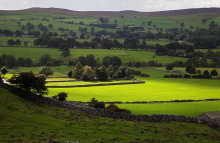 |
The study calls for more hedges, trees and stony habitats |
This is the result of new research published on September 13th by the French policy research institute IDDRI. The authors Pierre-Marie Aubert and Xavier Poux point out that the current European food system is not sustainable. “The European food system is often perceived as being highly productive,” they write. “However, for several decades, these successes have produced more and more serious social and environmental impacts. In terms of health, diet-related diseases are growing at an alarming rate (diabetes, obesity, cardiovascular disease).” European agriculture is also threatening biodiversity and contributing to the destruction of tropical forests through soybean imports. “Today, the European Union imports the equivalent of 35 million hectares of farmland, essentially soya from South America used to feed cattle,” Pierre-Marie Aubert was quoted by EURACTIV. “We are presenting an alternative scenario that can lead to a large scale transformation of the agricultural sector via the agroecological transition,” he added.
The experts developed a quantitative model, systemically comparing agricultural production and its uses (food, animal feed and fuel), modes of production and land use, and used it to quantify the implications of an agro-ecological scenario for 2050. Their TYFA scenario is based on abandoning pesticides and synthetic fertilisers, redeploying natural grasslands and extending agro-ecological infrastructures (hedges, trees, ponds and stony habitats), and adoptioning healthy diets. A shift to more healthy diets is needed since Europeans currently consume three times the recommended amount of sugar and double the recommended amount of protein while not eating enough healthy products. The scenario therefore includes fewer animal products, but more fruit, vegetables and fibre, consistent with recommendations by the European Food Safety Authority (EFSA).
The proposed transition to agroecology in Europe includes phasing-out pesticides and synthetic fertilisers. “The goal is to return to agroecosystems that make maximum use of soil life and legume symbiotic nitrogen fixation capacities,” the authors write. “Unfertilised natural grasslands and the animals that enhance them play a key role in this nitrogen supply.” In addition, the model includes a significant development of agro-ecological infrastructures – hedges, trees, ponds, stony habitats favourable to insects - to cover 10% of cultivated land, in addition to the extensive grasslands that are the main component of these infrastructures. “The shift to low-input agriculture with a high proportion of permanent extensive grasslands and other agroecological infrastructures thus makes it possible to directly address the restoration of biodiversity, the quality of natural resources and a reduction in greenhouse gas emissions.”
However, a transition to agroecology would be accompanied by a decline in production relative to the current situation and would imply a considerable reduction in non-food uses of biomass and biofuel production. The scenario uses the yield values observed today in organic agriculture to quantify the production levels in 2050, and assumes advances in research, such as plant breeding. The result is a decline in production of 35% compared to 2010 in kilocalories (-30% for plant products and -40% for animal products). However, the authors say that production would still be sufficient to feed Europeans, even when a high proportion of land is given over to agro-ecological infrastructures that do not directly produce but contribute to the functioning of agro-ecosystems. In addition, this agroecological Europe would still be able to maintain its export capacity for cereals, dairy products and wine. A transition to agroecology would results in a 36% reduction in agricultural greenhouse gas emissions compared to 2010 and the figure could even increase to 45% if emissions associated with “imported deforestation” are included, which will disappear if plant proteins imports are suspended. Such a transition would also help to restore biodiversity and to protect natural resources. “An agro-ecological Europe is a desirable, credible option to address food and environmental challenges,” the authors conclude.










No comments:
Post a Comment